- Home
- Christie Golden
ARKTIKA.1 (Short Story) Page 2
ARKTIKA.1 (Short Story) Read online
Page 2
Most of those infected were adult men, though there were some women as well. There were few children, but…there were children.
From about age ten on, when I could be trusted to work safely in the lab, I helped my mother. It was one way, in those dark and frightening early years, to spend time with her. I, of course, was not allowed near any of those quarantined, nor was I permitted to handle any body fluid samples. I mainly helped with organizing and cataloging.
Now, of course, we have computers, scanners. And me—the Viktoria I am now, not the Viktoria I was then. We are high-tech compared with most other colonies gripped so tightly by ice. But back then, power was used to provide the necessities of life, not the conveniences. So we wrote things down and filed them by hand.
Like any sane person, I had a healthy fear of the creatures and how quickly they could execute death—or a sentence that was much worse than death. My mother encouraged that fear, because fear exists to help keep us alive. But she also encouraged me to bring my rational mind into the mix. To understand how to protect myself and how I could turn that fear to something better. To discover a way to tackle the real enemy, which was not the creatures themselves but what made them into the creatures. “That,” she said to me, “is our foe. The disease, not the people who are victims of it.”
It seems strange to look back on those times with affection. But it felt good to me to be trusted with helping her, and although now, in hindsight, I believe I was not all that much help, I know that nonetheless Mamochka was glad to have me there.
All that changed one day when I was playing hide-and-seek with some of my friends. Misha said we were too old to be playing such childish games, but he joined in anyway. I think he just wanted to sound mature. Ha, look at him roll his eyes; I am right!
We all were very well aware that we were not supposed to wander too far from the central living areas. The problem was that we already had exhausted all the good hiding places in the area. So this time, I went down the escalator from the living space in the subway area…and took the elevator down into the parking garage.
It was very exciting. The area was full of old abandoned vehicles. Our friend Petya said that he used to go out there a lot at first, and he would come back with all kinds of trinkets that people had left in their cars. Money—useless now, of course—toys, letters, tissues, and so on. Early on, one might be able to find snacks or mints, but the rats got to most of that before we did.
It was so dark in the garage…and so cold, too. I looked around at some of the cars, wondering which one I would pick. I knew better than to get into an old car’s trunk, of course, but it was colder outside than I had expected it to be. Even in a garage, my coat was not enough protection. So instead of hiding under a car or between cars, I found one that was open and crawled inside, shivering. I curled myself as best I could into the backseat footwell and waited.
Time passed, and I began to rethink my decision. Would someone even come after me here? Would they know to look outside for me? That was not a comforting thought, but I could always go inside and find another spot if no one came. I decided to give it another few minutes.
Just then, I heard someone pounding on the car window. For the first time ever, I was glad I had been found. I looked up, relieved, to see who it was.
And I screamed.
I was staring directly into a gray face. It had a huge open mouth crammed with sharp teeth. If it had eyes, I could not see them. It was hairless and only vaguely resembled a human. It began to make this awful gurgling, snarling sound and pounded on the window. Its fingers were fused into only a few instead of the normal five; this detail stands out to me even now, almost more frightening, more inhuman, than the fangs and the horrible wet sound of its shrieking.
For a second, I was paralyzed with absolute terror. Then, shaking very badly, I reached up, opening the door on the other side, and tumbled out onto the pavement.
The monster leaped over the car, but by then I had scrambled beneath it. I lay there, my cheek pressed to the concrete, trembling, trying not to sob, certain that at any second it would figure out where I was and one of those horrifying fused-finger hands would seize me and drag me out to become its dinner—or, worse, it would just bite me, and then I would become like it.
But it did not discover me there, right in front of it. I watched its feet shuffle as it looked uncertainly one way and then another, and its snarling turned to confused grunts. Then it sprinted off, convinced that I somehow had eluded its grasp.
Tears warmed my face as I wept, biting hard on my lower lip to hold back my cries. When the ugly thing’s dreadful noises faded, I dragged myself to the edge of the car, where I could peer out. I forced my heart to slow, told my brain to think, and tried to recall where I was, how far away from the safety of the elevator I had wandered. Carefully, I crawled out from beneath my shelter and looked around. Hoping that it had left the area.
But it had not.
It was on top of a car only ten yards away from me, turning its head one way and then the other, its face crumpling as it sniffed.
I started to run. My footfalls rang out in that awful place. Even my breathing sounded loud to me. And then I heard it. The slobbering, hungry, horrifying sound of a whole group of them who wanted to feed.
I sobbed then and increased my speed, running as fast as I possibly could. Sheer terror gave my feet wings as I wove my way through the cars, wondering what had possessed me to pick a car that was so far away from safety, why I had even wanted to go into the parking garage in the first place. Even as I reached the closed elevator door, I could hear them coming.
They are…so fast. You will see. So unnaturally, horribly fast.
It seemed to me that I stood in front of the closed elevator door for years, stupidly hitting the button over and over again, tears pouring down my face. When it finally opened, I stumbled inside and slammed the “close door” button frantically, screaming in terror as three of them raced up.
For an awful second, I thought the door would close on their arms and they would be able to force their way inside. But they hurled themselves forward as the door closed, striking with a thump just as the elevator started to ascend. I flung myself into a corner, sobbing uncontrollably, holding myself and shaking.
When the doors opened onto safety, I was in a panic and screaming for my mother and father. The first thing my mother did when she found me, even before she hugged me, was to look at the places where my skin had been broken. I knew what she was looking for.
She was looking for bite or scratch marks.
You see, one did not have to eat human flesh to contract the disease. It is bloodborne. Something as simple as a bite or even a scratch that breaks the skin could transmit it.
I had plenty of scrapes and cuts, but thankfully, nothing from the creatures. Even so, Mamochka drew some blood and tested it just to be certain. After that, they doubled the security on all the exits and we moved back farther from the garage areas, yielding them to the creatures…and the bandits who were already starting to make their presence known.
I was never allowed back in the lab area after that little incident. Mamochka said she thought it would be too hard on me, too traumatic. I felt so guilty about scaring my parents, and I desperately missed my time with her. I wanted to show her I could be brave. I do not know if she was wrong or right to ban me from the area. I do know that I berated myself for my panic and fear after Mamochka had done so much to tell me to despise the disease, not the unfortunates who were unlucky enough to have contracted it. I felt as if I had failed her in some way, though she certainly did not think so.
You know, now that we are talking about it, I think I must have left my journal somewhere near the laboratory, because I never saw it after that day. That makes me sad, as I would be so interested to hear from my younger self.
Mamochka worked so hard to discover a cure for the TSE. Even something to slow its heartbreakingly swift progression. But she did not. To the best of my
knowledge, which is considerable and constantly being updated, no one has. One thing that I am sure about: Her diligence greatly reduced the number of cases.
You will soon learn, if you have not already, that we here at the colony love our old folktales. When the present is frightening, there is some comfort to be found in going over the stories that have been told for so long. We are a people used to winter, although of course it has never been quite like this. We have always adapted. And we adapt even now.
Many stories that even you may have heard of concern an old witch named Baba Yaga. Ah! I see you do recognize that name. Do you know the stories? No? Oh, my, she is quite a character. Baba Yaga is an ugly, twisted witch who lives in a house that stands on chicken legs. I know, I know…do not look at me! I did not make up the tales!
Baba Yaga is depicted in some stories as trying to trick and devour children or even, in some cases, the hero of the tale. I do not remember who, but someone started calling the cannibals yagas, and the name has continued to this day.
In the beginning, my parents did not want to leave the colony. Mamochka’s work was protecting so many, and she submitted all her data to a global organization of other researchers and scientists studying the disease. I have already mentioned the robots Papochka created. He reached out to Citadel Security, sending them recordings of his creations. They were impressed with his work, as well they should have been, and he parlayed his designs for supplies and equipment for the colony.
But Papochka had other ideas, too. He wanted to develop other types of robots, not just physically powerful ones to perform grunt work but robots with cutting-edge computers for brains. Androids that looked human so that the humans would feel comfortable with them. He was not the first, of course, to have this idea. Others were working on such things, too. At least they were before the Great Freeze. After that, such androids were seen as unnecessary, a luxury. The corporations were much more interested in practical applications like Papochka’s…silverbacks. But Papochka knew in his heart that androids had great potential. They were something between human and machine. Properly designed, they could embody the best of both. But Citadel continued not to be interested.
As time passed, the world gradually…I do not wish to say “stabilized,” because that is not correct. It certainly would not stabilize for some time; it could be said that it has not stabilized even yet. But humans are astoundingly resilient and adaptive. Technology and businesses began to emerge in the equatorial regions. The death toll slowed. New rhythms, ways of survival, of being in this world emerged. Some of those rhythms were positive. For example, there was tremendous growth in industries that focused their attention on developing easily transportable alternative sources of food, such as insect powder for protein. Because of that development alone, millions of people yet live who otherwise would have died.
Once we began to understand what the yagas were and how to safeguard ourselves against them and once Papochka struck his initial deal with Citadel, life in our little world here at Arktika.1 grew much easier. Then a discovery was made that changed the fate of the colony in a powerful and positive way.
By that time I was twelve years old. I remember the excitement when the first tests were run on the snow in the area and we discovered that it was heavy water.
When I first heard the term, I was confused—how could some water be heavier than other water? Water is water, da? I even said as much to my poor father, who laughed and hugged me and then very patiently explained what heavy water is.
Ordinary water, of course, is H2O. It is a compound of hydrogen and oxygen. The H in H2O stands for hydrogen, the 2 is because it has two atoms of that element, and the O is for oxygen. But heavy water has an isotope of deuterium and oxygen. So it is D2O, and it is water in which the isotope deuterium replaces hydrogen. Before the Great Freeze, there was only one part deuterium to every 6,670—
And there I go again. I see the details are not important to you. What is important to the colonists and the main reason you are here now sharing fellowship with us while drinking alcohol is that we learned that we had a rich source of a badly needed resource that was quite literally falling from the sky.
More research was done, and we sent the results to various corporations in the Equator. Today, we deliver deuterium and deuterium plasma to several different companies. It is quite valuable and has enabled us to obtain many of life’s staples and even a few comforts. We receive regular shipments of food and have been able to install and upgrade equipment to ensure our safety. It was after this that we were finally at a point where we could build Arktika.1, which is now so much safer than the old hub.
But, of course, those who possess something of value are always targets for those who do not. Before the discovery of the heavy water, the only bandits we had to deal with were stragglers from the old city. They were hungry and stole food. Others, unwilling to become part of the colony and desperate for some way to escape the ice and snow, stole smaller pieces of equipment they could sell or trade. Sometimes, instead of stealing, they killed for what they wanted. That was difficult enough. But once the colony began extracting and processing deuterium on site, we attracted unwanted attention.
There have always been those who are predators. Who murder or destroy to get what they want, without care for the precious thing that is a human life. It is unfortunate that many of the industries that flourish to this day are criminal organizations. And there is one thing that is certain in a world of uncertainty: There will always be small groups of bullies and cowards and terrorists who know that destruction is easier than creation. You will, I sadly believe, meet some of them when you go on your first mission: the clusters of bandits and soldiers of fortune who want to steal all that we have worked so hard for. To them, lives are nothing and money is all that matters.
That is why we have hired you—someone we can trust, who knows how to deal with scum like this. Who understands that what we have here is worth protecting—both the deuterium we process here and each individual life. Citadel Security employs both you and me, and you are well paid to put your life on the line.
That does not mean that we do not understand what you risk for us every day or that we are ungrateful. Because we are grateful. And that is why we wanted you to come visit with us tonight, before you begin your task of protecting us.
So. Where was I? Ah, yes.
Citadel, through my father, brought Arktika.1 to the attention of companies that needed what we produced. And it was four years after the Great Freeze when they asked my father to relocate to the Equator—to come to the main research facility there. After trying so hard for so long, he finally persuaded them to help him realize his dream: a fully functioning android that would serve as a go-between for the people of a remote location and the company. One that could hold all the information of a cutting-edge computer but that was in no way a threat but rather a friend.
You might think that such an offer would be easy to accept. My family would relocate to the Equator, and my father would be well compensated for his designs. We would no longer have to live in fear of yagas or bandits trying to kill us or take away what we had worked so hard to create. And, of course…it would be warm.
But I tell you that it was a surprisingly difficult decision for my parents. After all, this was our home. This was where I had been born, the site of the university where my parents had first studied, then taught, and then applied their knowledge to helping the community through a disaster that once had been so inconceivable as to be relegated to the realm of science fiction. My mother was loath to leave her lab, but she had trained her assistants well. They would carry on her work.
And, of course, there was me. I was twelve by the time we left. I had known nothing else, and as you can imagine, friendships formed in hardship are close indeed. I did not understand just how fine an offer this was until much later, but at the time I desperately wished to stay. Some of the colonists were angry at us. They felt we were abandoning them to get rich an
d fat in the Equator. But most understood why we chose to accept even if they were envious.
But soon they were not envious. The move to the Equator; the well-equipped labs; the plentiful, nutritious food; the safe, beautiful home—they ended up being bought at a dear price.
My memories of the time before the Great Freeze are, of course, those of a child. But I do remember how small the world had grown. People once thought nothing of getting on an airplane and traveling halfway around the world. And if you could not do that, technology made it possible to connect almost physically with someone at the touch of a button. A trip from the city to the Equator would take little more than a day.
But now the world was drastically different. Of course, Citadel Security had access to special planes. But weather grounded them or forced them to change course much of the time. In the end, it was determined that most of the trip would have to be by vehicle. And even with Citadel Security guards to protect us, we would still be in dangerous situations at certain points during the journey, although my parents tried to present it to me like a great adventure.
It was, for part of it. Some parts, though, were terrifying. And when we came under attack, it became tragic.
My parents survived. I did not.
The memory is the clearest one I have from my time as a living person. It was at night, and we were about two-thirds of the way toward our destination. We were trying to get ahead of a storm and make a switch from one safe car to another, but the storm overtook us, as snowstorms are wont to do. We waited until it passed, and while we successfully dug out the car, the road ahead was unpassable as it was still gripped by ice and snow. It was easily ten miles to where the car awaited us. We could take a shortcut, though—across a wide-open field. It was not a long trek, only a two-mile walk, but it was at night, through three feet of snow in subzero temperatures. What other choice did we have?

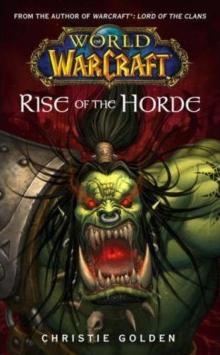 Rise of the Horde
Rise of the Horde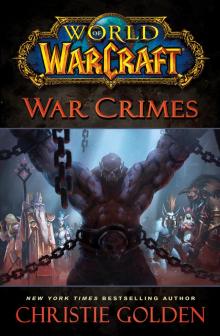 World of Warcraft: War Crimes
World of Warcraft: War Crimes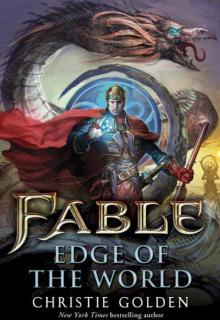 Fable: Edge of the World
Fable: Edge of the World Homecoming
Homecoming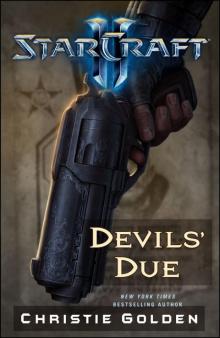 StarCraft II: Devil's Due
StarCraft II: Devil's Due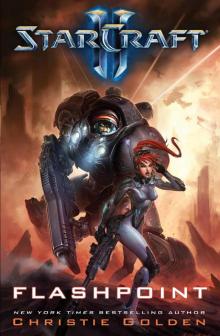 Starcraft II: Flashpoint
Starcraft II: Flashpoint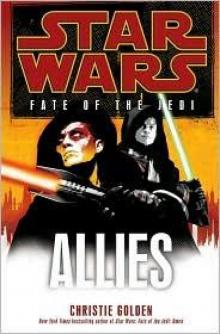 Allies
Allies Shadow Hunters
Shadow Hunters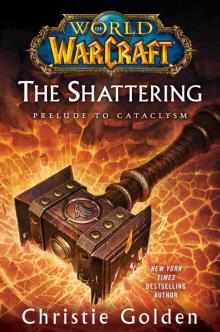 The Shattering: Prelude to Cataclysm wowct-1
The Shattering: Prelude to Cataclysm wowct-1 STAR TREK: VOY - Homecoming, Book Two - The Farther Shore
STAR TREK: VOY - Homecoming, Book Two - The Farther Shore King's Man and Thief
King's Man and Thief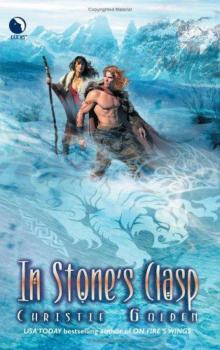 In Stone's Clasp
In Stone's Clasp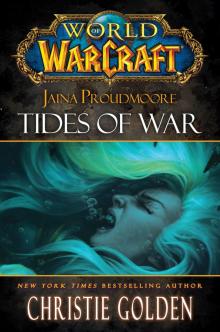 Jaina Proudmoore: Tides of War
Jaina Proudmoore: Tides of War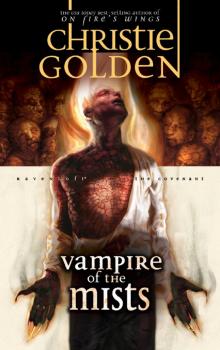 Vampire of the Mists
Vampire of the Mists Star Wars: Fate of the Jedi II: Omen
Star Wars: Fate of the Jedi II: Omen King's man and thief cov-2
King's man and thief cov-2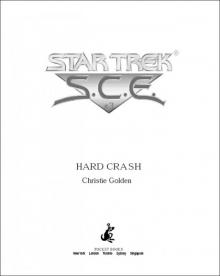 Star Trek
Star Trek StarCraft: Dark Templar: Twilight
StarCraft: Dark Templar: Twilight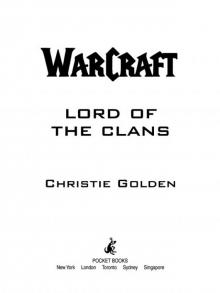 Lord Of The Clans
Lord Of The Clans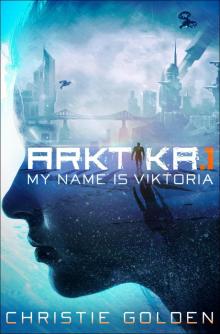 ARKTIKA.1 (Short Story)
ARKTIKA.1 (Short Story)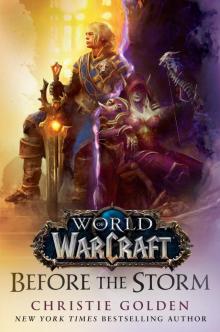 Before the Storm
Before the Storm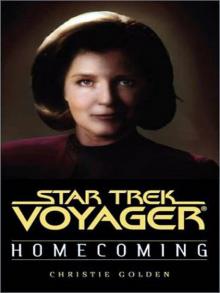 STAR TREK: VOY - Homecoming, Book One
STAR TREK: VOY - Homecoming, Book One Shadow of Heaven
Shadow of Heaven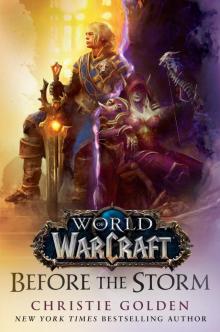 Before the Storm (World of Warcraft)
Before the Storm (World of Warcraft)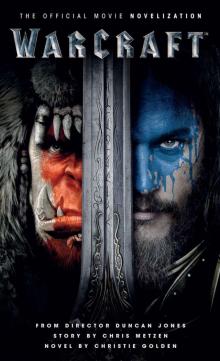 Warcraft Official Movie Novelization
Warcraft Official Movie Novelization Flashpoint
Flashpoint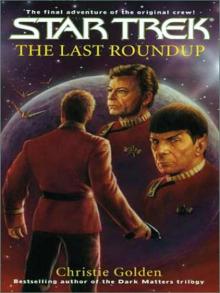 STAR TREK: The Original Series - The Last Roundup
STAR TREK: The Original Series - The Last Roundup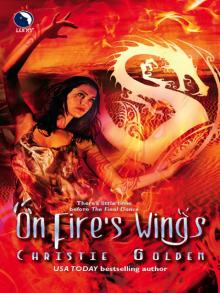 On Fire’s Wings
On Fire’s Wings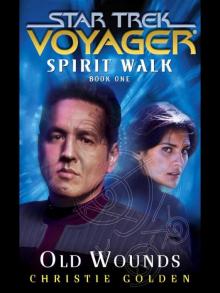 Spirit Walk, Book One
Spirit Walk, Book One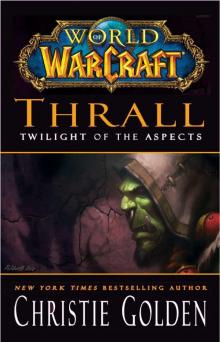 Thrall Twilight of the Aspects
Thrall Twilight of the Aspects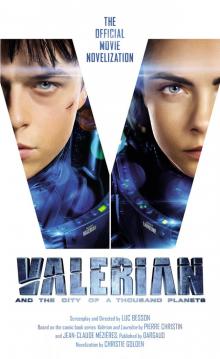 Valerian and the City of a Thousand Planets
Valerian and the City of a Thousand Planets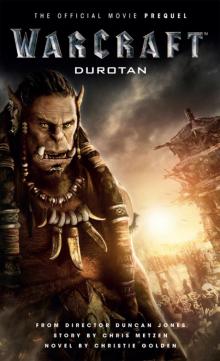 Warcraft
Warcraft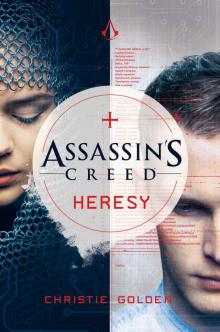 Assassin's Creed: Heresy
Assassin's Creed: Heresy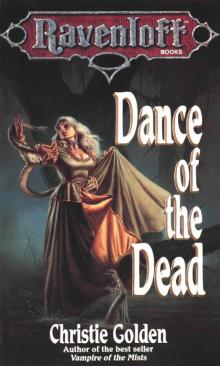 Dance of the Dead
Dance of the Dead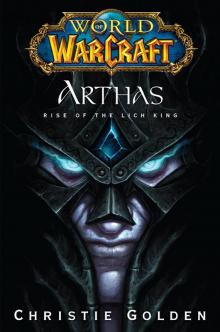 Arthas: Rise of the Lich King wow-6
Arthas: Rise of the Lich King wow-6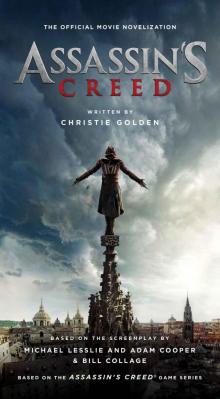 Assassin's Creed: The Official Movie Novelization
Assassin's Creed: The Official Movie Novelization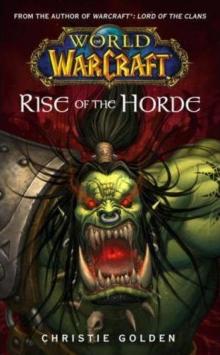 Rise of the Horde wow-2
Rise of the Horde wow-2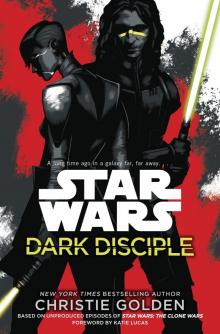 Dark Disciple
Dark Disciple Ghost Dance
Ghost Dance The Shattering
The Shattering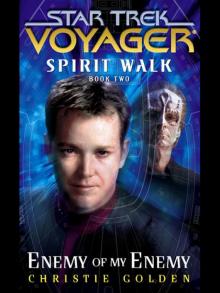 Spirit Walk, Book Two
Spirit Walk, Book Two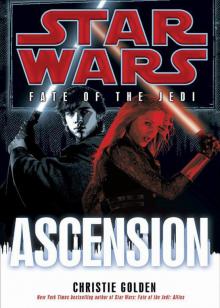 Star Wars: Fate of the Jedi: Ascension
Star Wars: Fate of the Jedi: Ascension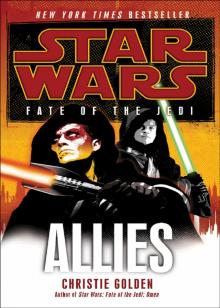 Star Wars: Fate of the Jedi V: Allies
Star Wars: Fate of the Jedi V: Allies The Enemy Within
The Enemy Within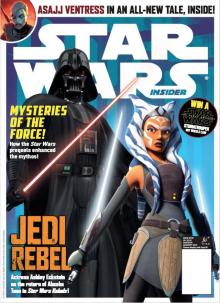 Kindred Spirits
Kindred Spirits The Farther Shore
The Farther Shore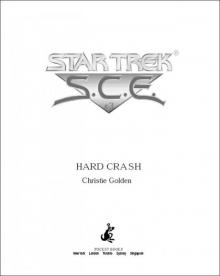 Star Trek: Hard Crash (Star Trek: Starfleet Corps of Engineers Book 3)
Star Trek: Hard Crash (Star Trek: Starfleet Corps of Engineers Book 3) Twilight
Twilight